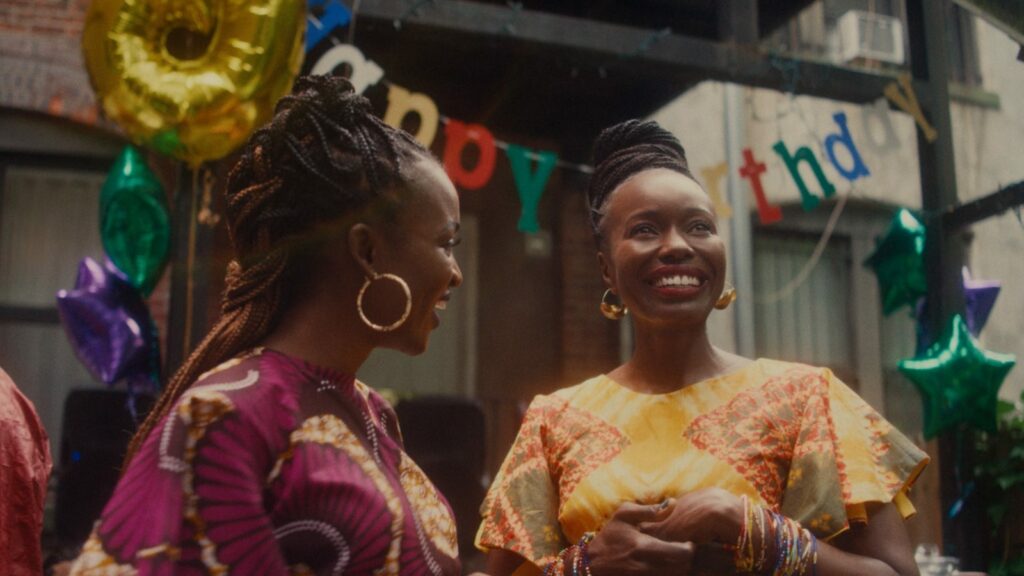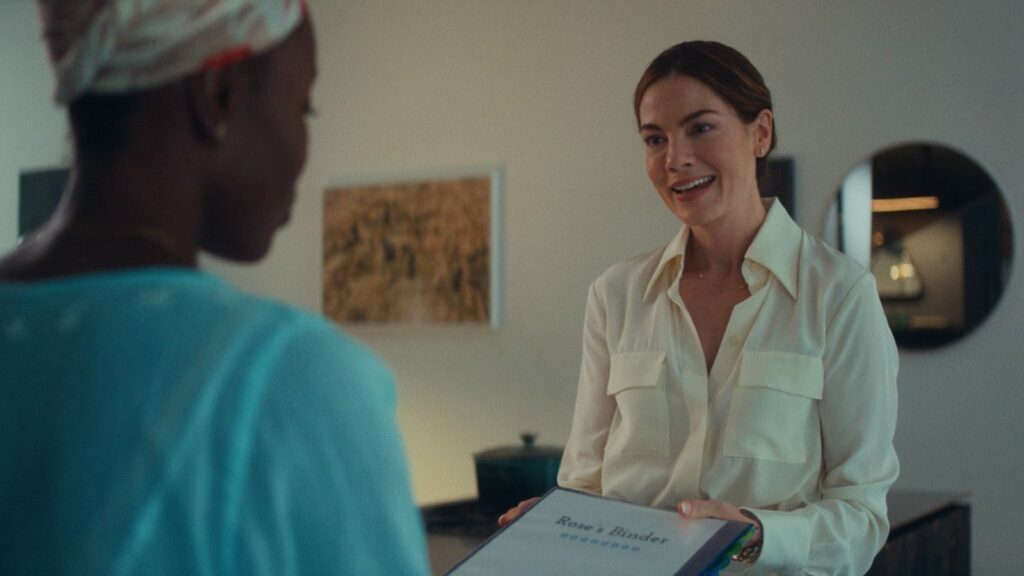Spiders’ legs grow threateningly long on the screen while water bubbles and crashes, haunting the film’s soundscape like a spectral whisper; this atmosphere of spiritual and psychological conflict defines Nikyatu Jusu’s directorial debut, Nanny, a film depicting Senegalese immigrant Aisha (Anna Diop) and her struggle against the misogynoir of her new job and her unwilling confrontation with the ancestral forces of West African goddesses and tricksters.

We meet Aisha in a moment of profound vulnerability. Sleeping, she grows surrounded by threatening waves while a spider crawls on her face. That vulnerability broadly characterises Aisha’s position as an immigrant to the United States – she lives with an auntie to whom she owes money, and the job she takes on as a nanny for affluent white woman Amy (Michelle Monaghan) and her husband with roving eyes, Adam (Morgan Spector), puts her in a position of immediate, barely-disguised exploitation.
The ethics of Jusu’s film are at once unshakingly present and deeply historical. In a January 2022 interview, Jusu spoke on how Ousmane Sembène’s Le noire de…/Black Girl (1967) – which depicts a Senegalese nanny named Diouana and her eventual death by suicide as a result of the racist violence she experiences by white, French employers – may not have been a direct referent for Nanny, but it was definitely part of her own coming-of-age as a director. This film’s care for Black women and desire to platform their voices are made clearer by Jusu’s allusions to women like Charleena Lyles, a Black woman who was killed by police in front of her children as she allegedly experienced a mental health crisis.

Jusu’s creation of this film came from her wish to expose the capitalist, anti-Black, misogynoiristic exploitation that befalls the real-life nannies that Diouana and Aisha represent: in a Twitter thread from October 2022, Jusu wrote, “I am not – ever – pulling inspiration from thin air, real life is more than enough material… I made this film to shed a bit of light on the ways essential work is full of abuse and disproportionate power dynamics, which never work in the caregiver’s favour.” In its totality, Nanny is a way to speak against these power inequities, for Aisha and many other women to assert their right to fair treatment and to be seen as whole people rather than part of the furniture.
Money and misogynoir define Aisha’s experience in her employers’ upscale loft: CCTV tracks Aisha’s use of the elevators while openly-placed nanny cams underscore how her time with young girl Rose (Rose Decker) is always controlled by the child’s liberal, racist parents. Furthermore, they stiff her on overtime and fight with her over the money she is owed. Not only does Aisha contend with financial problems, she also experiences deep sadness from her separation from her son, Lamine (Jahleel Kamara), who remains in Senegal with Aisha’s cousins until such time as Aisha can afford to bring him over to the United States. Contending with such tolling struggles, Aisha then begins to have occult experiences that escalate into her nightmares of the ghosts of Black boys that look like Lamine, and, at one point, of almost drowning.

The sources of this psychological, mythical terror are eventually found to be Anansi the spider, a West African trickster spirit, and Mami Wata, a West African goddess here represented as a mermaid, a deity associated with the shifting of reality and healing, among other symbols.
While Aisha’s love interest Malik’s (Sinqua Hall) grandmother Kathleen (Leslie Uggams) seems to suggest an underlying benevolence of these spirits, their violence and trickery is all too apparent. Aisha’s interaction with Mami Wata, in particular, is chilling and beautiful. Anansi is a dangerous presence throughout the film, teasing Aisha through body horror and premonitions spoken through Aisha’s ward, Rose. It is these two forces that plunge Aisha into a war with herself as well as with the circumstances of injustice that characterise her life as a West African immigrant.

Nanny benefits greatly from a talented cast: Diop as Aisha is breathtakingly human, her personal struggles coming to the fore through Diop’s nuanced performance. Hall as Malik offers a refreshing love interest, also credibly vulnerable and sweet. Further accolades must be given to Uggams’s performance as Kathleen, a woman who can “see,” meaning she is imbued with a connection to the spiritual realms. Monaghan’s and Spector’s performances are also to be applauded.
This reviewer’s only disappointment with the film is its end, which won’t be spoiled here. While the majority of Nanny functions as a cohesive force of fear and tension, the end of Aisha’s story is, while artful, ultimately unfulfilling.
Nanny premiered at the 2022 Sundance Film Festival, where Jusu became the second Black woman director to win the Grand Jury Prize.
Nanny debuted in select theatres in the United States on November 23rd and in the UK on November 25th, and will release on Prime Video from December 16th, 2022.
